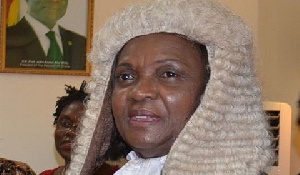General News of Saturday, 3 October 2015
Source: Daily Guide
Businessmen take over judiciary - CJ
The Chief Justice, Georgina Theodora Wood, has noted that the public has lost confidence in the judiciary, as regards upholding the values in which they have been trained and for which they proclaim fidelity.
She said most of them “have become unbridled businessmen and women whose only desires are to maximise profit and amass wealth at the expense of professional and ethical behaviour.”
The CJ made these observations at the 2015 call to the bar of 219 new lawyers including the Deputy Minister of Employment and Labour Relations and Member of Parliament for Akwatia, Baba Jamal, at a ceremony in Accra.
According to her, the recent scandal that hit the judiciary had brought into focus the need for members of the legal fraternity to take an introspective look of themselves.
She said the sober reflection would help them identify where they had fallen short, stagnated or even regressed; and fashion out the appropriate remedial measures that would diminish, if not totally extinguish, the possibility of a future occurrence.
The Chief Justice stated that beyond the introspection and internal institutional remedial mechanism, it must be emphasised that the burden of sanitising the judiciary could not be the exclusive responsibility of the Chief Justice.
Justice Wood hinted that the judiciary was in the process of setting up an Investigative Commissioner whose job it would be to proactively investigate and process cases of ethical abuse by lawyers and hold them to account before the General Legal Council, the body that regulates the behaviour of lawyers.
Her Ladyship said, “We as individuals must commit to do what is right and avoid creating fertile situations for abuse, misconduct and corruption within the chain of the administration of justice.”
She added that evil and wrongdoing could only thrive when there was an agreement between two or more persons to make it happen.
She noted that the Judicial Council (JC) had been very unrelenting in its pursuit to build a robust and trustworthy judiciary and had taken disciplinary action against judges who had been found to have indulged in unethical and unprofessional behaviour.
The CJ observed that the General Legal Council, which ensures that disciplinary actions are taken against offending lawyers, was very much up to the task and “to those intent on engaging in unprofessional behaviour and sharp practices, the long arm of the council awaits you.”
Justice Wood warned that the investigative efforts of the judiciary were at an all-time high and they would not tire in their desire to fish out errant lawyers and judges and deal with them under the law, adding that the long arm of civil and criminal justice awaited them.
Furthermore, she said she was determined to take an uncompromising stand against the complex global phenomenon of international corruption and that there was the need for lawyers to learn from international best practice and assist companies to develop and operate anti-bribery policies and programmes.
Touching on reforms in the legal education, she observed that different faculties had sprung up with different standards in teaching and pedagogy, adding that some of the schools were deprived of a teaching faculty and that they had to depend on staff from other schools and they also lacked library facilities.
She stated that the setting of law faculties had become an economic proposition and that “while opening up faculties of law is a good thing, shambolic legal education would only spell doom for Ghana’s young democracy.”
She commended the National Accreditation Board for ensuring that the standards were maintained but said owners of some schools had employed evasive techniques and that an independent Examinations Board had been set up to ensure integrity in the conduct of examinations.
The CJ urged the new lawyers to be diligent and work hard to gain the respect of everyone to enable them enjoy the wealth that comes with it in peace.
This year’s overall best student for the Mensah Sarbah Memorial Prize went to Grace Esi Sackey, who was also the best student in Criminal Procedure, Company Law, Family Law and Practice, and Law of Taxation; and it was presented by Justice Bright Mensah, a High Court Judge.
The Attorney-General, Marrieta Brew Appiah-Oppong, moved the motion for the new lawyers to be enrolled.
In attendance was Benson Nutsukpui, president of the Ghana Bar Association as well as the Director for Legal Education, Kwasi Prempeh Eck.











